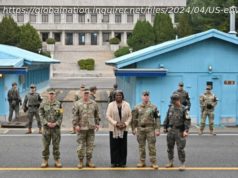For Seoul resident Hwang In-cheol, 50, the North’s presence at the Winter Games is a reminder that his father has been held captive since 1969.
SEOUL — North Korea’s charm offensive at the Olympics has made headlines, but not everyone here is delighted by the synchronized cheerleading squads or the enigmatic smile of dictator Kim Jong Un’s sister.
For Seoul resident Hwang In-cheol, 50, the North’s presence at the Winter Games reminds him of his father, who has been held captive in North Korea since 1969.
Hwang and other human rights activists argue that South Korea’s promotion of the Games in Pyeongchang as the “Peace Olympics” overlooks the forced abduction and detention of its citizens by North Korea.
“The South Korean government has a legal obligation to urge North Korea to return my father,” Hwang said. “But instead of doing that, the government is keeping its silence, and by doing so it has become an inadvertent accomplice to these criminal acts.”
The United Nations estimates up to 100,000 South Koreans were captured and held in North Korea during the 1950-1953 Korean War, and another 516 have been abducted since, most of them fishermen.
Hwang’s story began when he was only 2. On Dec. 11,1969, his father Hwang Won boarded a Korean Air Lines flight for a short journey to Seoul from Gangneung, the city now hosting the ice events for the Winter Games.
Ten minutes after takeoff, a hijacker commandeered the plane and forced it to land at Yonpo Airfield, near the city of Hamhung on North Korea’s east coast.
A standoff ensued for more than two months, with North Korea initially insisting the pilot had flown to the country on his own. But after international pressure and massive street protests in South Korea, North Korea released only 39 of the 50 South Koreans on the flight. Seven passengers, including Hwang’s father, who was a television producer, and the four crew members were kept behind.
North Korea still insists those 11 chose on their own to stay there.
For Hwang, it was the start of a childhood waiting for his father, then 32, to come home. His mother told the distraught toddler that his dad had gone to America and would be returning for Christmas.
“Whenever I was hanging out with my friends in the neighborhood, I said, ‘Hey my father’s returning this Christmas with toys,’” Hwang said. He recalls once seeing a cowboy in a cartoon about the Old West: “I even told my friends that when my father returns, he’ll be bringing a horse. But he never came back.”
In 2001, Hwang began actively working on his father’s case. North and South Korea had just started a limited series of family reunions for separated families.
Hwang was watching a story on the news about the reunions that showed one of the abducted flight attendants meeting her mother.
He looked at his own daughter, then 2 years old, and “felt the pain of a parent being ripped away from their children.”
Hwang decided to start a campaign for his father’s release. He registered with the Korean Red Cross, which facilitates the family reunions. But the North Korean side insisted his father’s whereabouts could not be confirmed.
Hwang turned to South Korea’s Ministry of Unification, which manages inter-Korean affairs, without any success. Hwang argues that cases like his have long been ignored in order to improve relations between the two Koreas.
“As the North and South attempt more rapprochement, more engagement, more peace initiatives, issues like ours become a hindrance,” he said. “The South Korean government wants the families of the victims to remain quiet.”
Hwang didn’t give up. He turned to the United Nations, which highlighted his father’s story in a 2016 report on separated families.
“These violations are not going unnoticed by the international community,” said Signe Poulsen, the South Korea representative with the U. N.’s Office of the High Commissioner for Human Rights.“Resolving these abductions, addressing this with the government of (North Korea), becomes a very crucial and central tenet of any sustainable future peace.”
Hwang still believes he’ll see his father again. A broker who helps North Korean refugees escape told Hwang recently that his dad — now 80 — is still alive and living in the city of Pyongsong.
Hwang started a “Bring My Father Home” campaign last year with the help of a local charity, and supporters held a panel discussion in February at South Korea’s National Assembly.
Some of the speakers criticized the friendly images of North Korea at the Olympics, while Hwang’s dad and others were still being held.
“The South Korean government has spent a huge amount of tax money to provide the venue for North Korea to spread its propaganda,” said Kim Seok-woo, the South’s former vice minister of unification. “It is truly worrisome, and I fear that we are giving North Korea nothing more than the valuable time it needs to continue to develop its nuclear arsenal.”
Seoul should have two diplomatic objectives in dealing with North Korea: denuclearization and improvement of human rights, said Lee Jung-hoon, a professor at Yonsei University’s Graduate School of International Studies and former human rights ambassador for South Korea.
“The abduction incident of Korean Air is an important part,” he said. “We need to clearly convey these objectives. Otherwise the South Korean government will not have a firm authority backed by public support,” he said.
Hwang said watching extensive coverage of the North Korean delegation at the Olympics made him uneasy. He felt South Korea was again trying to engage the North without pressuring its neighbor on human rights.
“I saw the unification flags being raised, people from both Koreas dancing together, celebrating,” he said. “Rather than anger, a sense of resignation is what I feel. I’m just concerned. I keep wondering how South Korea will be used by North Korea next.”






